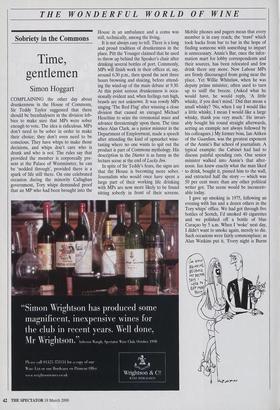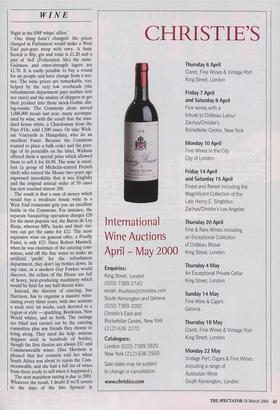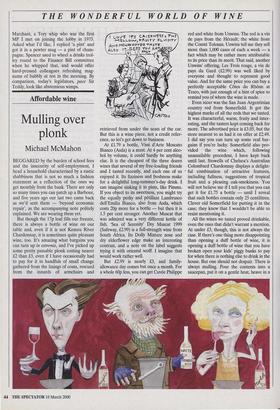Sobriety in the Commons
Time, gentlemen
Simon Hoggart
COMPLAINING the other day about drunkenness in the House of Commons, Sir Teddy Taylor suggested that there should be breathalysers in the division lob- bies to make sure that MPs were sober enough to vote. The idea is ridiculous. MPs don't need to be sober in order to make their choice; they don't even need to be conscious. They have whips to make those decisions, and whips don't care who is drunk and who is not. The rules say that provided the member is corporeally pre- sent at the Palace of Westminster, he can be 'nodded through', provided there is a spark of life still there. On one celebrated occasion, during the minority Callaghan government, Tory whips demanded proof that an MP who had been brought into the House in an ambulance and a coma was still, technically, among the living.
It is not always easy to tell. There is a long and proud tradition of drunkenness in the place. Pitt the Younger claimed that he used to throw up behind the Speaker's chair after drinking several bottles of port. Commonly, MPs will finish work in their offices at, say, around 6.30 p.m., then spend the next three hours browsing and sluicing, before attend- ing the wind-up of the main debate at 9.30. At this point serious drunkenness is occa- sionally evident and, when feelings run high, brawls are not unknown. It was rowdy MPs singing 'The Red Flag' after winning a close division that caused an enraged Michael Heseltine to seize the ceremonial mace and advance threateningly upon them. The time when Alan Clark, as a junior minister in the Department of Employment, made a speech after attending the kind of upmarket wine- tasting where no one wants to spit out the product is part of Commons mythology. His description in the Diaries is as funny as the lecture scene at the end of Lucky Jim.
In spite of Sir Teddy's fears, the signs are that the House is becoming more sober. Journalists who would once have spent a large part of their working life drinking with MPs are now more likely to be found sitting soberly in front of their screens. Mobile phones and pagers mean that every member is in easy reach; the 'trawl' which took hacks from bar to bar in the hope of finding someone with something to impart is unnecessary. Annie's Bar, once the infor- mation mart for lobby correspondents and their sources, has been relocated and few drink there any more. New Labour MPs are firmly discouraged from going near the place. Yet Willie Whitelaw, when he was deputy prime minister, often used to turn up to sniff the breeze. (Asked what he would have, he would reply, 'A little whisky, if you don't mind.' Did that mean a small whisky? `No, when I say I would like a little whisky, I mean I would like a large whisky, thank you very much.' He invari- ably bought his round straight afterwards, setting an example not always followed by his colleagues.) My former boss, Ian Aitken of the Guardian, was the greatest exponent of the Annie's Bar school of journalism. A typical example: the Cabinet had had to discuss painful spending cuts. One senior minister walked into Annie's that after- noon. Ian knew exactly what the man liked to drink, bought it, pinned him to the wall, and extracted half the story — which was 50 per cent more than any other political writer got. The scene would be inconceiv- able today.
I gave up smoking in 1975, following an evening with Ian and a dozen others in the Tory whips' office. We had got through five bottles of Scotch, I'd smoked 40 cigarettes and we polished off' a bottle of blue Curacao by 5 a.m. When I 'woke' next day, I didn't want to smoke again, merely to die. Such occasions were fairly commonplace; as Alan Watkins put it, 'Every night is Burns Night in the SNP whips' office.'
One thing hasn't changed: the prices charged in Parliament would make a West End pub-goer weep with envy. A basic Scotch is 80p, gin and tonic is £1.20 and a pint of 'fed' (Federation Ale) the same. Guinness and extra-strength lagers are £1.70. It is easily possible to buy a round for six people and have change from a ten- ner. The wine prices are remarkable, too, helped by the very low overheads (the refreshments department pays neither rent nor rates) and the anxiety of shippers to get their product into those mock-Gothic din- ing-rooms. The Commons alone served 1,006,000 meals last year, many accompa- nied by wine, with the result that the stan- dard house white, a Chardonnay from the Pays d'Oc, sold 1,500 cases. Or take Wick- am Vineyards in Hampshire, who do an excellent Fume. Because the Commons wanted to place a bulk order and the pres- tige of its portcullis on the label, Wickam offered them a special price which allowed them to sell it for £6.90. The wine is excel- lent (a group of Michelin-starred French chefs who toured the House two years ago expressed incredulity that it was English) and the original annual order of 50 cases has now reached almost 200.
The result is that a sum of money which would buy a mediocre house wine in a West End restaurant gets you an excellent bottle in the Commons. For instance, the separate banqueting operation charges £20 for the most popular red, the Baron de Ley Rioja, whereas MPs, hacks and their visi- tors can get the same for £12. The most expensive wine on general offer, a Pouilly Fume, is only £15. Since Robert Maxwell, when he was chairman of the catering com- mittee, sold off the fine wines to make an artificial 'profit' for the refreshment department, they don't lay bottles down. In any case, as a modern Guy Fawkes would discover, the cellars of the House are full of heavy, heat-producing machinery which would be fatal for any half-decent wine.
Instead, the director of catering, Sue Harrison, has to organise a massive wine- tasting every three years, with two sessions a week over six weeks, each devoted to a region or style — sparkling, Bordeaux, New World whites, and so forth. The tastings are blind and carried out by the catering committee plus any friends they choose to bring along. They need the help: anxious shippers send in hundreds of bottles, though the first choices are always EU and Commonwealth wines. (Sue Harrison is pleased that her contacts told her when South Africa was about to rejoin the Com- monwealth, and she had a full list of wines from there ready to sell when it happened.) The next marathon tasting is due in 2001. Whatever the result, I doubt if we'll return to the days of the late Spencer le
Marchant, a Tory whip who was the first MP I met on joining the lobby in 1973. Asked what I'd like, I replied 'a pint' and got it in a pewter mug — a pint of cham- pagne. Spencer used to wheel a drinks trol- ley round to the Finance Bill committee when he whipped that, and would offer hard-pressed colleagues refreshing mag- nums of bubbly at ten in the morning. By comparison, today's legislators, pace Sir Teddy, look like abstemious wimps.




















































































 Previous page
Previous page